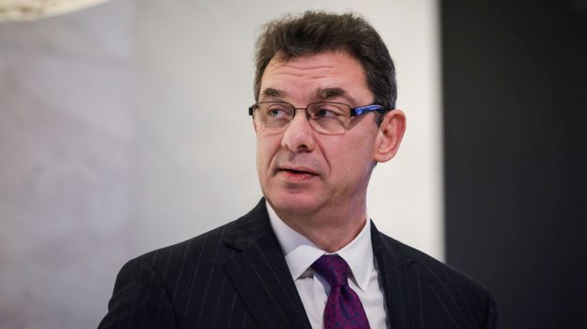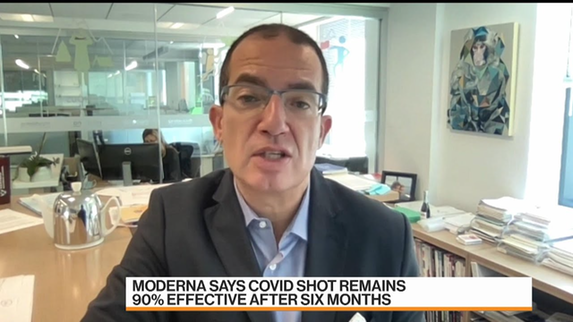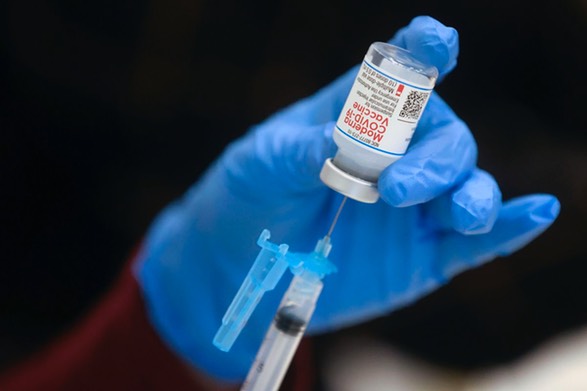
Pfizer CEO Albert Bourla said people will “likely” need a booster dose of a Covid-19 vaccine within 12 months of getting fully vaccinated. His comments were made public Thursday but were taped April 1.
Bourla said it’s possible people will need to get vaccinated against the coronavirus annually.
“A likely scenario is that there will be likely a need for a third dose, somewhere between six and 12 months and then from there, there will be an annual revaccination, but all of that needs to be confirmed. And again, the variants will play a key role,” he told CNBC’s Bertha Coombs during an event with CVS Health.
“It is extremely important to suppress the pool of people that can be susceptible to the virus,” Bourla said.
Pfizer CEO Albert Bourla said people will “likely” need a third dose of a Covid-19 vaccine within 12 months of getting fully vaccinated. His comments were made public Thursday but were taped April 1.
Bourla said it’s possible people will need to get vaccinated against the coronavirus annually.
The comment comes after Johnson & Johnson CEO Alex Gorsky told CNBC in February that people may need to get vaccinated against Covid-19 annually, just like seasonal flu shots.
Researchers still don’t know how long protection against the virus lasts once someone has been fully vaccinated.
Pfizer said earlier this month that its Covid-19 vaccine was more than 91% effective at protecting against the coronavirus and more than 95% effective against severe disease up to six months after the second dose. Moderna’s vaccine, which uses technology similar to Pfizer’s, was also shown to be highly effective at six months.
Pfizer’s data was based on more than 12,000 vaccinated participants. However, researchers say more data is still needed to determine whether protection lasts after six months.
Earlier Thursday, the Biden administration’s Covid response chief science officer, David Kessler, said Americans should expect to receive booster shots to protect against coronavirus variants.
Kessler told U.S. lawmakers that currently authorized vaccines are highly protective but noted new variants could “challenge” the effectiveness of the shots.
“We don’t know everything at this moment,” he told the House Select Subcommittee on the Coronavirus Crisis.
“We are studying the durability of the antibody response,” he said. “It seems strong but there is some waning of that and no doubt the variants challenge ... they make these vaccines work harder. So I think for planning purposes, planning purposes only, I think we should expect that we may have to boost.”
In February, Pfizer and BioNTech said they were testing a third dose of their Covid-19 vaccine to better understand the immune response against new variants of the virus.
Late last month, the National Institutes of Health started testing a new Covid vaccine from Moderna in addition to the one it already has, designed to protect against a problematic variant first found in South Africa.
Moderna CEO Stephane Bancel told CNBC on Wednesday that the company hopes to have a booster shot for its two-dose vaccine available in the fall.
The CEO of Pfizer is comparing the COVID vaccines to flu shots. Every year millions of Americans rush out to get their flu shots, and the CEO of Pfizer is admitting that it looks like the COVID vaccines will be on a similar schedule…
“There are vaccines that’s like polio that one dose is enough, there are vaccines like pneumococcal vaccine that one dose is enough for adults and there are vaccines like flu that you need every year,” Bourla said. “The Covid virus looks more like the influenza virus than the polio virus.”

Moderna hopes to have Covid booster shot for its vaccine ready by the fall, CEO says
Moderna hopes to have a booster shot for its two-dose Covid vaccine available in the fall, CEO Stephane Bancel told CNBC on Wednesday.
“I want to make sure there are boost vaccines available in the fall so that we protect people as we go into the next fall and winter season in the U.S.,” Bancel said in an interview on “Squawk Box.”
Last month, the National Institutes of Health began testing a variety of offerings from Moderna to use as a third shot designed to boost immunity protection as concern grows about emerging variants — including the one first discovered in South Africa, also known as the B.1.351 variant.
The Food and Drug Administration’s approach to authorizing modified Covid vaccines is similar to that of annual flu vaccines, meaning they could be cleared for emergency use without lengthy clinical trials.
Massachusetts-based Moderna hopes to submit data to regulators within a few months, Bancel added. “Our goal is to work really hard to get this ready before the fall,” he reiterated.
Bancel’s comments came one day after Moderna announced its existing vaccine was more than 90% effective at protecting against Covid up to six months after the second dose. It was more than 95% effective against severe disease within that same time frame, the biotech firm said in its update, which could bring it closer to obtaining full regulatory approval.
There are currently 453 reported cases in the U.S. involving the B.1.351 variant, according to data compiled by the Centers for Disease Control and Prevention. That variant, in particular, has concerned public health experts. It’s been shown to reduce the effectiveness of existing Covid vaccines, including from Moderna.
Bancel on Wednesday reiterated his belief that annual Covid vaccine boosters will be commonplace going forward, saying the coronavirus “is not going away” and it’s “not leaving the planet.”
“I anticipate in the next year or so, we’re going to see a lot of variants. But as more and more people get vaccinated or naturally infected, the pace of the variant is going to slow down and the virus is going to stabilize like you see with flu,” he said.
Eventually, Bancel added, Moderna hopes to be able to have a two-in-one vaccine of sorts that protects against seasonal flu and Covid. The company in September announced its intentions to make a flu vaccine.
“What we’re trying to do at Moderna actually is to get a flu vaccine in the clinic this year and then combine our flu vaccine to our Covid vaccine so you only have to get one boost at your local CVS store ... every year that would protect you to the variant of concern against Covid and the seasonal flu strain,” Bancel said.
“We believe we can get to a high efficacy flu vaccine,” he added. On any given year, current flu vaccines are roughly between 40% and 60% effective, according to the CDC.
Bancel also weighed in on U.S. regulators recommending Tuesday that states pause using Johnson & Johnson’s single-shot Covid vaccine after concerns arose around rare but severe blood clots developing in recipients.
The move shows “the FDA will not hesitate to be very cautious to analyze the data, to take the time required to do so, to protect the safety of the American people,” he said, contending that the way regulators are handling the J&J situation would reduce vaccine hesitancy not increase it.
And of course lots of people are still getting sick after being fully vaccinated. According to the CDC, so far there have been almost 6,000 documented cases of people being infected after getting two shots, and dozens of them have died…
The Centers for Disease Control (CDC) has reported that roughly 5,800 people who received a coronavirus vaccine still ultimately came down with the disease anyway, according to CNN.
Of those 5,800, 396 of them (roughly 7 percent) were hospitalized; 74 of the vaccinated people ultimately died. The report proves that the vaccines, though frequently touted by the government and the media, are not guaranteed to prevent everyone from contracting the virus.
